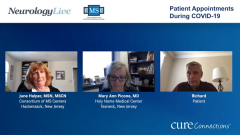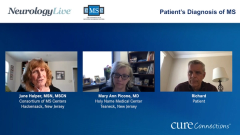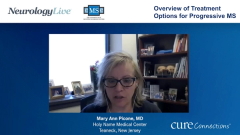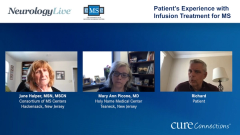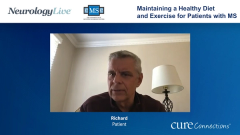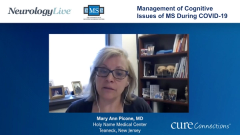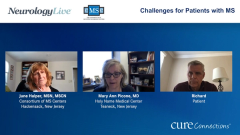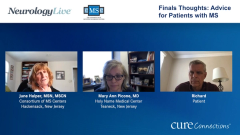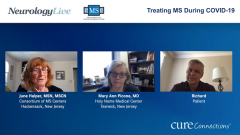
Patient Appointments During COVID-19
A patient, Richard, discusses his positive experience with multiple sclerosis virtual visits during COVID-19.
Episodes in this series

June Halper, MSN, MSCN: Richard, you live pretty far away. Did you find that COVID-19 challenged you to get to the office, or did you use the virtual visits? How did you feel about them?
Richard: I was able to use a virtual visit with Dr Picone. It was actually seamless. We worked ahead of schedule to make sure that the video was going to work and everything was spot on. Then you dial up and we were able to have a televisit without any issues. Dr Picone is astute enough to take the time, and we discussed a lot of issues. Other than the physical prodding, it worked really well. We had no problems with the telehealth visit.
June Halper, MSN, MSCN: I’m hearing a lot of patients saying, “These were so good. I wish they would continue afterward.” How do you feel about that, Richard? Do you think this is going to last?
Richard: As technology changes, the telehealth visits will probably become more commonplace. Maybe they’ll be able to check our blood pressure online and things will change. It’s the beginning of a new way of medicine. For me, living so far away, it’s a breeze to get online and have the doctor look at me, listen to me, and talk to me. A big part of what we’re doing during COVID-19 is just trying to assess our mental state and things like that. It’s definitely a way for the future.
June Halper, MSN, MSCN: Yes, I agree with you. Do you monitor your symptoms? Do you keep track of it so that when you have televisits, you’re able to tell Dr Picone all the details?
Richard: I don’t monitor my health to the point where I take my blood pressure every day or things like that. About once a month, my wife will take my blood pressure to make sure it’s in a good range. I try to go on and have a day without all the medical issues. I want to explore life instead of being bogged down with those issues all the time.
June Halper, MSN, MSCN: Are you physically active? Do you exercise or participate in yoga or some of the exercises that are recommended?
Richard: For years, I swam. I lost the ability to go to my pool because the pool is closed. For me, swimming was the best. You’re buoyant in a pool, you get to relax, and you get to exercise and work out at your rate in a pool. I thought it was the best exercise. Because I’m home most of the time, I do a lot of stretching. I stretch every day. My No. 1 goal is probably to stretch, so even if I’m making dinner or talking to my son, I may be in a forward fold just to try to get a hamstring stretch.
June Halper, MSN, MSCN: That’s great. Do you normally go to physical therapy throughout the year?
Richard: I don’t. I stay extremely active around my home. I use an adult tricycle to get me out. If the weather is good, I’ll be on that every day. I try to stay active but to a point that it doesn’t fatigue me.
June Halper, MSN, MSCN: You’re a good role model. You’re the person we like to tout and say, “Keep moving.”
Richard: Yes, I definitely keep moving.
June Halper, MSN, MSCN: I want to thank our audience for watching this NeurologyLive® Cure Connections®. If you enjoyed this program, please subscribe to our e-newsletter to receive information about upcoming programs.
Transcript Edited for Clarity
Newsletter
Keep your finger on the pulse of neurology—subscribe to NeurologyLive for expert interviews, new data, and breakthrough treatment updates.

